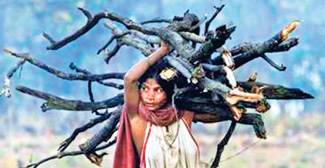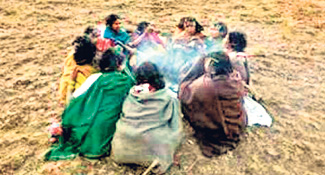LANJIGARH, India, (Reuters) - As Hollywood rolls out the red carpet for the Oscars, a world away in remote eastern India, activists say the story of the blockbuster sci-fi film Avatar — nominated for nine awards — is being played out.
Set in the fantasy world of Pandora, Avatar tells the story of the Na'vi — a clan of blue-hued humanoids whose existence is threatened by a mining corporation which wants to exploit a vast store of mineral deposits which lies beneath a giant sacred tree.
In India's impoverished but mineral-rich state of Orissa, hundreds of indigenous tribespeople are battling to stop London-listed Vedanta Resources Plc from extracting bauxite from what they say is their sacred mountain.
 |
| A woman from the Dongria Kondh tribe carries firewood as other members of the tribe gather on Niyamgiri mountain(below), which they worship as their living god, to protest against plans by Vedanta Resources to mine bauxite from that mountain near Lanjigarh in India's Orissa state February 21, 2010. |
 |
"The fundamental story of Avatar — if you take away the multi-coloured lemurs, the long-trunked horses and warring androids — is being played out today in Niyamgiri mountain in India's Orissa state," said Stephen Corry, director of the British charity, Survival International.
"Like the Na'vi of Avatar, the Dongria Kondh tribes are also at risk." Vedanta says its mine would not violate the rights of indigenous tribespeople, saying that all its projects are conducted within the law and using international best practices.
"It is a myth that people don't want development. The tribals want their children to go to school and have enough to eat," said Mukesh Kumar, CEO of Vedanta's alumina refinery, located at the foot of the mountain, which will process the bauxite.
"If the mine goes ahead, Vedanta will help them to achieve this." NGOs like ActionAid say around 8,000 people will be affected by Vedanta's mining plans which have been stalled since 2005 due to legal wrangles over environmental and social concerns. Vedanta says it expects approval from authorities in the coming months.
Since 2007, four international investors — including the Church of England — have sold off their stock in the company citing ethical concerns over the project.
Last month, Britain's Joseph Rowntree Charitable Trust sold its 1.9 million pound share, saying Vedanta was "pushing industrialisation to the detriment of the lives of local people".
Industrialisation
While the box-office hit's story to save the Na'vi's "Tree of Souls" is a battle between good and evil, the fight for Niyamgiri mountain appears more a dilemma of industrialisation versus tribal rights.
The tussle in the lush mountain forests of Niyamgiri between the Dongria Kondh people and Vedanta highlights a broader standoff between industry and villagers and tribesmen in India's mineral belt -- made up of the country's most underdeveloped states of Orissa, Jharkhand and Chhattisgarh.
Steel companies like Arcelor Mittal and POSCO are facing resistance from establishing plants, not only from villagers and tribesmen, but from Maoist insurgents who for decades have been waging a war against industrialisation.
Companies and the federal government argue that in a country where around 40 percent of the population lives below the poverty line, exploiting lucrative deposits of minerals such as iron ore, bauxite, coal and manganese is the only answer.
Last month, the mines minister said India planned to raise the compensation for people displaced by large mining projects in a move that could sooth opposition to leases but will raise costs.
Local development
Vedanta, which has already built an alumina refinery at the foot of the mountain in Lanjigarh town, in anticipation of gaining clearance to mine, says the planned project will not affect the tribespeople or the environment.
And the multinational has also launched a campaign to win hearts and minds through a range of corporate social responsibility activities, which includes building schools, and health clinics and income-generation projects.
Vedanta's Kumar says the impoverished town was a mere assortment of tribal villages with little infrastructure and public services before Vedanta arrived.
"The refinery has improved people's lives," said Kumar, adding that the number of malaria cases and families living below the poverty line has fallen since the refinery was established.
Signs on everything from roads and bridges to traffic police booths are adorned with the company's name and logo. Schools, clinics and even electricity poles are labelled "Vedanta" in bold blue.
Many local tribespeople remain sceptical. At a clearing at the foot of Niyamgiri, hundreds of Kondh tribespeople gather to worship the mountain god, Niyam Rajah — the provider of food, water, shelter and medicine.
"We have lived here for thousands of years and have always worshipped Niyam Rajah in our villages," said Mukuna Majhi, a bare-chested elderly man, carrying an axe over his shoulder. |

